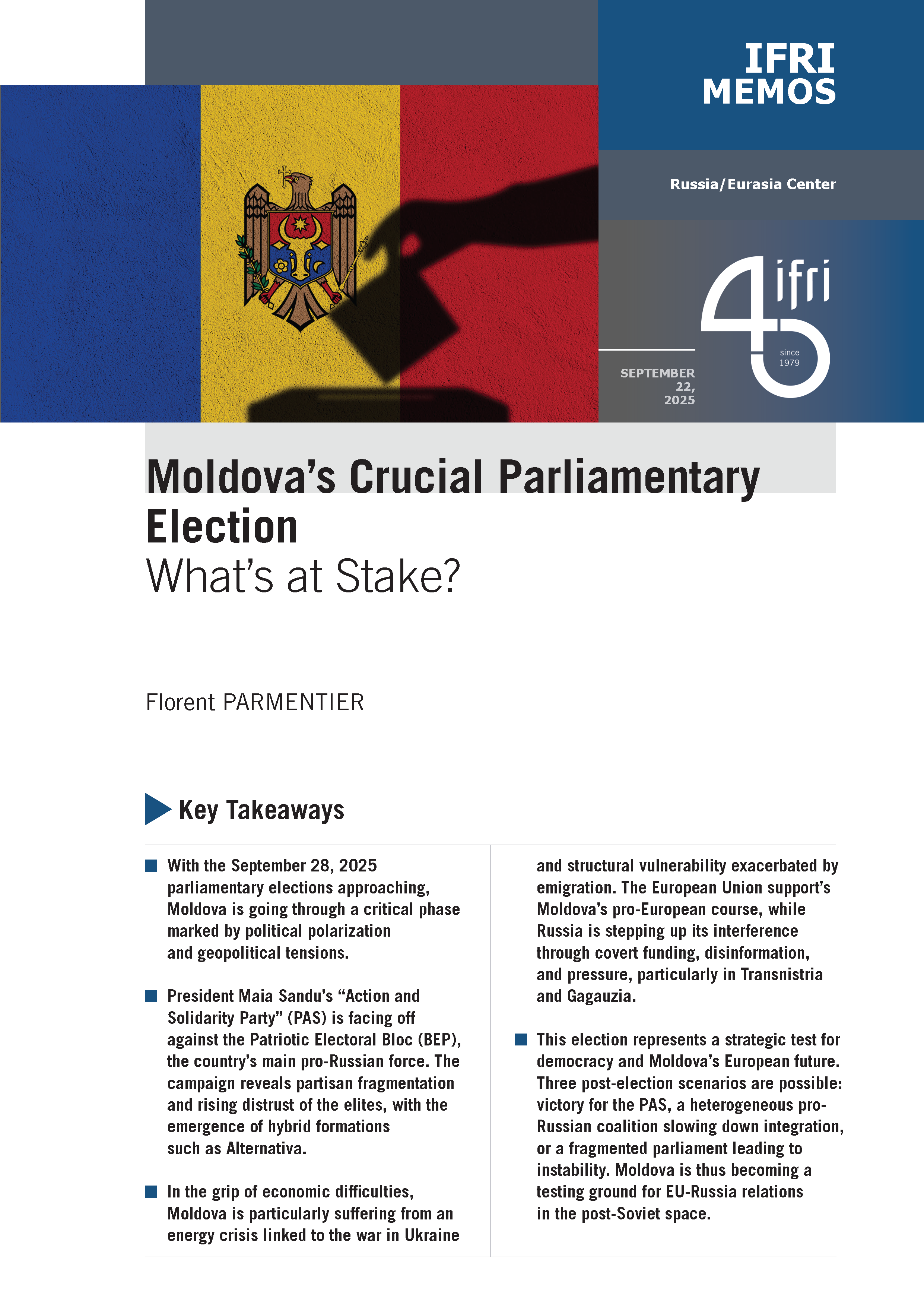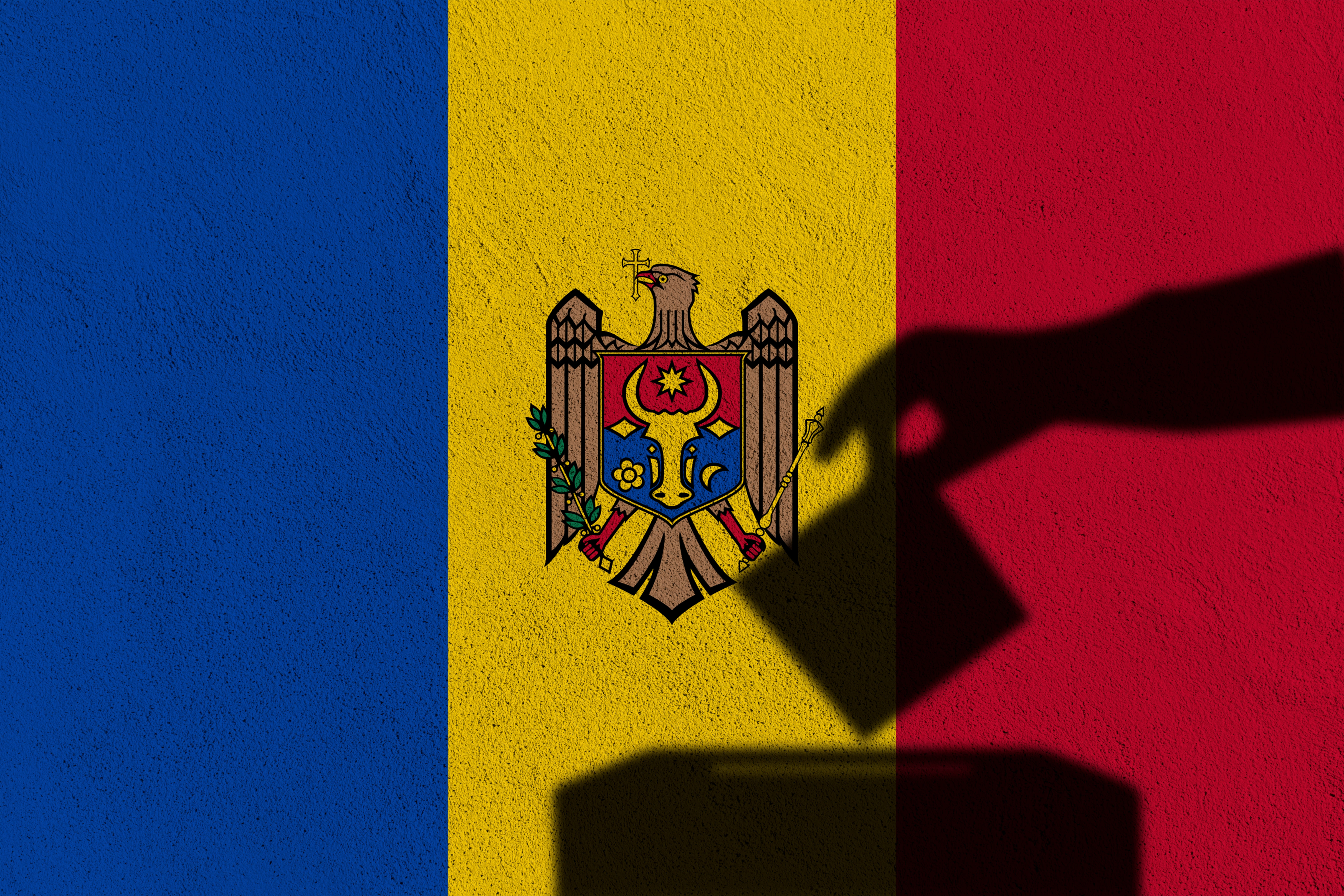Moldova's Crucial Parliamentary Election. What's at Stake?

On the occasion of Moldova’s National Day, August 27, 2025, Chișinău hosted a high-level European delegation composed of Emmanuel Macron, Friedrich Merz and Donald Tusk, who sought to reaffirm their support for the country’s sovereignty and pro-European course. This unprecedented and highly symbolic visit took place at a pivotal moment. Moldova is preparing for decisive parliamentary elections on September 28, whose stakes extend far beyond the national framework.

The electoral campaign, running from August 29 to September 26, crystallizes a profound reconfiguration of internal divides—between pro-European and pro-Russian forces—and external ones, in a regional context shaped by the war in Ukraine and Moscow’s attempts at interference. The vote, organized under a proportional system—with thresholds of 2% for individual candidates, 5% for parties and 7% for electoral blocs—will renew the 101 seats of the Moldovan Parliament. This election is shaping up to be crucial, as it will determine the geopolitical future of this former Soviet republic, located between the European Union’s eastern border and Ukraine.
Titre Edito
Reorganization of the party system
Reorganization of the party system
As the parliamentary elections approach, Moldova’s political landscape is undergoing a profound reconfiguration, marked by the erosion of traditional reference points and the emergence of new partisan constellations. The historical divides—pro-Romanian versus pro-Russian, then pro-European versus pro-Russian—illustrate the permeability between identity issues in domestic politics (majority population versus ethnic minorities) and orientations in foreign policy, whether pro-Russian or pro-European. Specific political behaviors are characteristic of the autonomous region of Gagauzia, strongly inclined toward the pro-Russian camp, as well as of the separatist region of Transnistria in the east of the country. Added to these are more classical variables, opposing urban and rural populations, as well as different generations. This fragmentation reflects a society under strain, torn between contradictory aspirations and growing distrust toward the elites.
The “Action and Solidarity Party” (PAS), the pro-European formation of President Maia Sandu—reelected in November 2024—remains the country’s dominant political force. In the previous parliamentary elections of July 2021, it secured 52.8% of the vote and 63 deputies, thereby creating the conditions for a stable majority around the presidential program. Firmly established in Chișinău, in the west of the country, and strongly supported by a mobilized diaspora, especially in Europe, PAS embodies reformist continuity. Yet its partisan isolation on the political spectrum undermines any prospect of alliance, a path explicitly rejected by the President. This strategy is a double-or-nothing gamble; ruling out alliances before the elections may consolidate the pro-European electorate, but it also limits options after the vote in case of failure. By contrast, the Impreuna (“Together”) Bloc, which seeks to rally disillusioned pro-European voters without drifting into anti-Westernism, struggles to cross the 7% electoral threshold despite its “Pact for Europe”—inspired by similar agreements in Romania prior to its EU accession—committing its members to support Moldova’s EU membership.
Facing them, two pro-Russian blocs structure the opposition: the Patriotic Electoral Bloc (BEP) and movements linked to Șor. The former is an alliance of former Presidents Igor Dodon (2016-2020) and Vladimir Voronin (2001-2009), strengthened by regional figures such as former Gagauzia Governor Irina Vlah (Inima Moldovei, “Heart of Moldova”), as well as former Prime Minister Vasile Tarlev (Viitorul Moldovei, “The Future of Moldova”). The bloc emphasizes Moldova’s neutrality and sovereignty, presenting European integration as a threat to national independence, while advocating closer ties with Russia. As for the “Victory” bloc of exiled oligarch Ilan Șor, it was excluded from the ballot for illegal financing, a decision embedded in a broader effort to curb Russian interference. This exclusion found an international echo in the European Council’s July 15, 2025 move to impose targeted sanctions on seven individuals and three entities linked to Ilan Șor, reflecting the convergence of Moldovan and European efforts to counter destabilization attempts. As a result, most of the electorate considered “pro-Russian” is expected to concentrate around the BEP.
Positioning itself as pro-European, the Alternativa Bloc—founded on January 31, 2025—is led by prominent political figures: Chișinău mayor Ion Ceban, former prosecutor general and 2024 presidential runner-up Alexandru Stoianoglo, former Prime Minister Ion Chicu, and political strategist Mark Tkaciuc. This bloc seeks to attract the “neither-nor” electorate (neither Russia nor the West), weary of ideological confrontation, while adopting a pragmatic stance and maintaining ambiguous international connections. However, the bloc suffered a major diplomatic setback when Ion Ceban was denied entry into Romania and the Schengen Area for security reasons on July 9, 2025. This decision highlights potential contradictions between its declared European ambitions and the realities of relations with EU partners, even though Ceban himself framed it as a politically motivated move influenced by President Sandu, a close ally of the current Romanian President Nicușor Dan.
On the margins, Renato Usatîi’s “Our Party”, led by the former mayor of Bălți, plays the populist and anti-corruption card, with pro-Russian and regionalist rhetoric. Although strong at the local level and successful in presidential elections, where Usatîi twice finished third, it has struggled to translate this popularity into national representation, as evidenced by its 4.1% share in the previous parliamentary election.
Against this backdrop of chronic coalition instability and ideological realignment, the September election could usher in a new phase of fragmentation, in which no single actor seems capable of durably uniting the aspirations of a society seeking stability, sovereignty, and clear prospects in both economic and security matters.
Titre Edito
Economic stagnation, reforms and internal polarization
Economic stagnation, reforms and internal polarization
Moldova heads into the September 2025 parliamentary elections in a climate of social and economic tension marked by persistent stagnation. This economic gloom is reflected in GDP figures. According to the World Bank, after a contraction of 4.6% in 2022, GDP grew by 1.2% in 2023 and just 0.1% in 2024. The country, already weakened by structural imbalances, was hit by an inflationary shock of nearly 30% as a result of the war in Ukraine. The energy crisis that struck Transnistria in early 2025 exposed the vulnerability of the national supply system and deepened territorial disparities. As the campaign begins, economic issues dominate Moldovans’ concerns. Productivity remains low, foreign investment limited, infrastructure underdeveloped, and massive emigration—particularly of young workers—continues to drain the country of its human capital. It is estimated that more than one million Moldovans now work abroad, representing more than a quarter of the total population—including residents and the diaspora population. Each year, between 35,000 and 40,000 people leave the country, an exodus that could reduce the population to 1.9 million by 2040, according to projections by the Center for Demographic Research.
At the institutional level, judicial reform remains the flagship but unfinished project of Maia Sandu’s mandates. While the president maintains an image of integrity, tangible results have been slow to materialize. The arrest on July 24, 2025, of oligarch Vlad Plahotniuc—the central figure behind the 2014 “stolen billion” scandal —marked an important step in the fight against corruption. However, Russian influence networks persist, particularly in autonomous regions. The seven-year prison sentence handed down to former Gagauzia governor Evghenia Hutsul for illegally financing the Șor party with undeclared Russian funds reignited tensions between Chișinău and pro-Russian strongholds. Gagauzia, historically close to Moscow, now presents itself as a hub of opposition openly hostile to the government’s pro-European agenda.
In this context, the September elections will not only be a democratic test; they will embody a moment of truth for a country seeking coherence between its European ambitions, its economic realities and its internal tensions.
Florent Parmentier, PhD in political science, is Secretary-General of CEVIPOF—Sciences Po and an associate researcher at HEC Paris. He also teaches European politics at Sciences Po and is notably the author of La Moldavie à la croisée des mondes [Moldova at the Crossroads of Worlds], Paris, Non Lieu, 2019 (with Josette Durrieu).
Titre
Key Takeaways
With the September 28, 2025 parliamentary elections approaching, Moldova is going through a critical phase marked by political polarization and geopolitical tensions.
President Maia Sandu’s “Action and Solidarity Party” (PAS) is facing off against the Patriotic Electoral Bloc (BEP), the country’s main pro-Russian force. The campaign reveals partisan fragmentation and rising distrust of the elites, with the emergence of hybrid formations such as Alternativa.
In the grip of economic difficulties, Moldova is particularly suffering from an energy crisis linked to the war in Ukraine and structural vulnerability exacerbated by emigration. The European Union support’s Moldova’s pro-European course, while Russia is stepping up its interference through covert funding, disinformation, and pressure, particularly in Transnistria and Gagauzia.
This election represents a strategic test for democracy and Moldova’s European future. Three post-election scenarios are possible: victory for the PAS, a heterogeneous proRussian coalition slowing down integration, or a fragmented parliament leading to instability. Moldova is thus becoming a testing ground for EU-Russia relations in the post-Soviet space.

Available in:
Themes and regions
ISBN / ISSN
Share
Download the full analysis
This page contains only a summary of our work. If you would like to have access to all the information from our research on the subject, you can download the full version in PDF format.
Moldova's Crucial Parliamentary Election. What's at Stake?
Related centers and programs
Discover our other research centers and programsFind out more
Discover all our analysesRussia, the Palestinians and Gaza: Adjustments after October 7th
The Soviet Union (USSR), and subsequently the Russian Federation as its internationally recognized legal successor, has consistently sought to play a visible role in efforts to resolve the Israeli-Palestinian conflict.
Deathonomics: The Social, Political, and Economic Costs of War in Russia
The report attempts to outline and examine a truly new phenomenon in Russian society, dubbed “deathonomics”—the making of a mercenary army against the backdrop of the Kremlin’s war in Ukraine, eventually replacing both the Soviet (conscript) and early new Russian (contract) armies. It notes that, by the end of 2023, this trend had turned the military service into one of the highest-paying professions in the country, something not seen in Russia on such a scale since the late 17th century.
Russia's Asia Strategy: Bolstering the Eagle's Eastern Wing
Among Russia’s strategic priorities, Asia traditionally played a secondary role compared to the West. In the mid-1990s, then Foreign Minister Yevgeny Primakov initiated a rapprochement with China and India. Then, in 2014, deteriorating relations between Russia and the West prompted Moscow to begin its “great pivot to the East”.
Kazakhstan After the Double Shock of 2022: Political, Economic and Military Consequences
The year 2022 represented a dual shock for Kazakhstan. In January, the country faced its most severe political crisis since independence, followed in February by Russia’s full-scale invasion of Ukraine, which cast uncertainty over the borders of post-Soviet states. These consecutive crises profoundly shaped Kazakhstan’s domestic and foreign policy.










